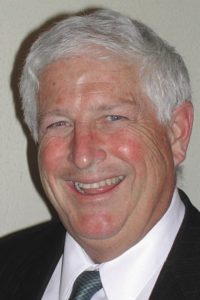Did the county help a future Phillips 66 appeal?
March 17, 2017
By MICHAEL F. BROWN
The San Luis Obispo County Board of Supervisor’s reasons for denying the Phillips 66 permit will provide fertile ground for a reversal of that denial in the Superior Court.
Last Tuesday the Board of Supervisors denied the Phillips 66 Nipomo refinery a permit to allow the unloading of more tank cars on a vote of 3-1. The refinery needs alternative sources of crude oil because local California supplies are declining. Supervisors Lynn Compton, Bruce Gibson, and Adam Hill voted to deny the permit; Supervisor Debbie Arnold voted to approve the permit; and Supervisor John Peschong could not vote or be present because prior to his election to the board, his consulting firm had worked for Phillips.
There was over 200 public speakers, out of which about five in support of the project.
In contrast to all the rhetoric, Supervisor Bruce Gibson distilled the essence of the question when summarizing his reasons to vote to kill the permit application. He acknowledged that some proponents (and the county’s environmental impact report) had provided statistical information that the chances of a catastrophic incident resulting in a fire and/or explosion somewhere along the national train routes or in SLO County were extremely small. Nevertheless, he said that in his mind, even though statistical chances of such an incident occurring are very rare, the consequences of a serious incident are so disastrous that the proposed project must be rejected.
Gibson went on to equate the situation with a nuclear plant disaster and stated that nuclear plants are much more safety oriented than railroads, thus further attempting to justify his decision to deny the permit.
It is likely that Gibson carefully planned this statement to fortify the board’s decision against the lawsuit, which is likely to be filed in an effort to overturn that decision. Often courts are reluctant to invade the province of the legislative acts of government enacting land use regulations and will not do so unless they find that the proceedings contained legal process violations or blatant factual errors, or were based on unreasonable standards or imposition of unreasonable requirements.
In this case the board was not legislating, but was conducting a quasi-judicial proceeding on whether Phillip’s application complied with county land use plans and ordinances that had already been legislatively adopted. The test will be: Was the decision supported by the evidence, and is the evidence supported by the facts?
Gibson’s own statement opens a serious potential vulnerability to the county’s defense of its denial. He knew that the statistical chance of an incident was remote and he said he knew it. Then he essentially said he didn’t care about that fact. Instead he and his colleagues, who voted to deny the permit, were holding Phillips 66 to an impossible and unreasonable standard: The project must have no risk whatsoever. Thus, Phillips would have had to guarantee that there would never be an accident that would result in large-scale contamination, fire, or explosion.
Courts have held that counties and cities may not hold applicants for land use permits to standards that are arbitrary and unreasonable. Here, Gibson essentially admits that this reasoning is exactly the thinking underlying his vote.
Separately from that issue, there has been an ongoing debate about whether the county has the legal authority to deny the project on the basis of events that might happen “up track.” Up track is a collective term referring to anything that might happen from the point of origin of a tank car train outside San Luis Obispo County to its ultimate arrival in Nipomo. The trains will travel hundreds or even thousands of miles from oil fields in the Midwest, Oklahoma, Texas, and Canada. It is even possible that oil could come from newly developed fields in Pennsylvania, New York State and Tennessee.
The debate has been focused on whether regulation of the risks of spills and fires along the routes could be used by the Board of Supervisors to legally justify its denial. County Counsel, relying on a letter from former State Attorney General Kamala Harris, has opined, “Maybe.” There has been considerable back and forth over this issue.
What has been ignored is that the board largely denied the project on the basis of a potential problem which might occur in another jurisdiction as a reason to deny a permit. Aside from a belated staff assertion that there is an environmentally sensitive habitat area on the site (questionable fact), the board’s legal denial findings all involve potential up track problems.
This is especially important in this case, because ten of the county’s eleven findings of significant un-mitigatable impacts (legal reasons for denying the project) theoretically occur in unspecified up track locations and off the project site (not on the Phillips property). This could be in the City of San Luis Obispo, Boise, or in the boondocks of the Nevada desert – somewhere along the route.
The board’s findings and evidence in this case are speculative. The board never studied and could not know the rail track conditions along the potential routes. It knows that derailments causing releases are statistically unlikely. It has simply conjectured that a potential accident along one of the routes is actual valid evidence that the project should be denied. This would be like banning the permitting of homes in wooded hilly areas of California because it is too dangerous on account of urban wildland intermix firestorms (which occur much more regularly than disastrous tank car derailments).
It is ironic that the City of Berkeley, the City of Oakland, the City of Santa Barbara, Santa Barbara County, the City of Goleta, and others with substantial populations living within the fire intermix zones formally took actions to oppose the Phillips rail spur. After all, 25 people died and thousands of homes were destroyed in the 1991 Oakland – Berkeley firestorm. Both cities immediately allowed expedited reconstruction on an accelerated basis, recreating the exact situation that had resulted in the disaster in the first place.
Similarly, Santa Barbara County has allowed expedited reconstruction and even new development in the intermix zone after repeated fires. In fact Santa Barbara County Supervisor Janet Wolf lost her home in the 1990 “Painted Cave Fire” and then rebuilt and moved back.
No one, including even some of the retired fire chiefs who spoke in opposition to the Phillips project, ever said a word when they were in charge. What if future fires spread into the dense urban area of Santa Barbara, illustrated here? Homes and other structures are conflagration breeders, shooting flaming brands in advance of the actual fire front.
This was never about Safety: Tank cars containing oil, ammonium hydroxide, sulphuric acid, chlorine, and many other dangerous substances have rolled through the area every day for a century.
It was about attacking the fossil fuel industry: Instead, a massive statewide opposition movement, undergirded by anti-industrial and anti-fossil fuel radicals, and led by the activist group known as 350.org has framed the issue as exploding tank cars (“bomb trains”). Speaker after speaker on the record confirm this, stating that “the fossil fuel industry is in its death throws,” “a system based on oil is defunct,” “20th century (oil) technology and 19th century transportation technology (rail) must be abolished,” and so on.
By their very nature, extracting and refining minerals, smelting metals, manufacturing chemicals and durable goods, transporting hazardous raw materials, processing agricultural products, producing electricity on a large scale, producing and distributing medical gases, spraying crops, and many other essential industrial processes are inherently hazardous. But without them, the standard of living would be devastated. Civilization would collapse. What if people in all the counties of America (about 3,000) decided that industrial processing is too hazardous and violates their respective general plan elements and environmental standards?
You Can’t Have it Both Ways: When one of the planners or one of planning commissioners or one of the members of the Board of Supervisors has a heart attack at 3 a.m., they want the phone to work, the dispatch system to work, the ambulance to come, the lights to be on in the cardiac care unit, the hospital to be warm, the medical gases to be plentiful, the plastic oxygen mask to be ready and functioning. Each of these things and processes are currently about 86 percent dependent on fossil fuels. Tank cars that bring them go through Salt Lake City, Boise, Tucson, San Antonio, Sacramento, Los Angeles, Oakland, San Bernardino, and even Berkeley. To what exceptional privilege do people in San Luis Obispo County, or the entire state of California for that matter, claim that they should be exempt from hosting the industrial plants, mines, oil fields, etc., which make their very lives and standard of living possible?
 The Anti-Industrial Policy Is Not Only Selfish – It Is Classist and Elitist: Do those who opposed or denied this project consider themselves members of an elite group, to be served by less affluent others in distant locations that must separately bear the risks of industrial society?
The Anti-Industrial Policy Is Not Only Selfish – It Is Classist and Elitist: Do those who opposed or denied this project consider themselves members of an elite group, to be served by less affluent others in distant locations that must separately bear the risks of industrial society?
It is not as if this project is a new refinery or that the tracks are part of a new railroad. Do they think it’s OK for families in Contra Costa County, who have lived next to huge refineries, tanker facilities, and rail facilities for generations (and where this oil will be tankered even if this project is denied), to bear the risk so that the elite can drive their Mercedes Benzes to LAX and fly to Cabo?
After all, they all drive cars, fly on 777s, use plastic, enjoy hot water on demand, and wear clothes made of synthetic products. Indeed, they depend on a huge fleet of tandem tanker trucks, which deliver thousands of gallons of highly volatile gasoline into their very neighborhoods and densest commercial areas every day without a second thought (12 billion gallons per year in California). At least the tank car trains run in dedicated right of ways, which are often grade separated from adjacent traffic and activities.
When judged in the moral and ethical light of the benefits of an industrial civilization, civic responsibility, and material practicality, the board had plenty of reason to override its staff and the SLO County Planning Commission and approve the project.
The board’s weak and grasping rationale for denial of the project may actually help Phillips gain reversal of the denial in court. Since people in SLO County, including much of the political leadership and the main daily newspaper, are so prejudiced against the project specifically and the fossil fuel industry in general, Phillips should petition for a change of venue and request a jury trial in the Santa Barbara County Superior Court in Santa Maria or perhaps the Kern County Superior Court in Bakersfield.
Mike Brown is the Government Affairs Director of the Coalition of Labor Agriculture and Business (COLAB) of San Luis Obispo County. He had a 42-year career as a city manager and county executive officer in 4 states including California. He can be reached at mike@colabslo.org.







The comments below represent the opinion of the writer and do not represent the views or policies of CalCoastNews.com. Please address the Policies, events and arguments, not the person. Constructive debate is good; mockery, taunting, and name calling is not. Comment Guidelines